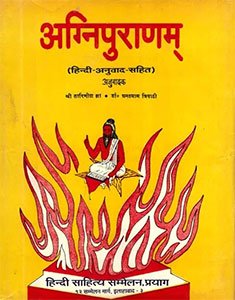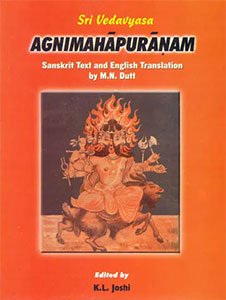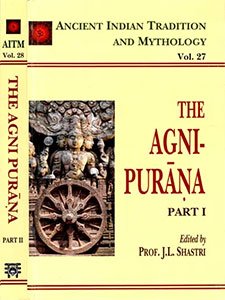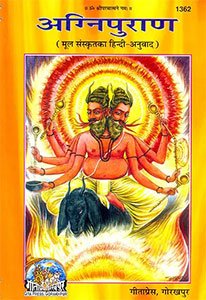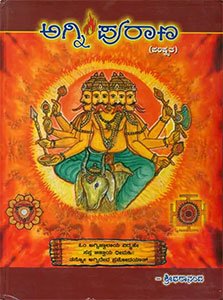Agni Purana [sanskrit]
97,288 words
This Sanskrit edition of the Agnipurana. It is one of the traditional eighteen Mahapuranas presented as an encyclopedia of ancient Indian history and knowledge. It contains either 382 or 383 chapters and over 10.000 verses (Sanskrit Shlokas).
Verse 96.90
ओं हां शक्तितत्तवाय नम हत्यादि ।
ओं हां शक्तितत्त्वाधिपाय नम इत्यादि ।
ओं हां क्ष्मामूर्त्तये नमः ।
ओं हां क्ष्मामूर्त्त्यधीशाय शिवाय नम इत्यादि ।
ओं हां पृथिवीमूर्त्तये नमः ।
ओं हां मूर्त्त्यधिपाय ब्रह्मणे नम इत्यादि ।
ओं हां शिवतत्त्वाधिपाय रुद्राय नम इत्यादि ।
नाभिकन्दात्समुच्चार्य्य घण्टा नादविसर्प्पणं ।
ब्रह्मादिकारणत्यागाद् द्वादशान्तसमाश्रइतं ॥ ९० ॥
oṃ hāṃ śaktitattavāya nama hatyādi |
oṃ hāṃ śaktitattvādhipāya nama ityādi |
oṃ hāṃ kṣmāmūrttaye namaḥ |
oṃ hāṃ kṣmāmūrttyadhīśāya śivāya nama ityādi |
oṃ hāṃ pṛthivīmūrttaye namaḥ |
oṃ hāṃ mūrttyadhipāya brahmaṇe nama ityādi |
oṃ hāṃ śivatattvādhipāya rudrāya nama ityādi |
nābhikandātsamuccāryya ghaṇṭā nādavisarppaṇaṃ |
brahmādikāraṇatyāgād dvādaśāntasamāśraitaṃ || 90 ||
The Sanskrit text of Verse 96.90 is contained in the book The Agni Puranam (Anandashram Edition) by Shri Chimna Apate (श्री चिमणा आपटे). This book is available online or you could buy the latest edition:
Read online Buy now! The Sanskrit text by Shri Chimna Apate (श्री चिमणा आपटे) (1987)
Glossary of Sanskrit terms
Note: This extracts Sanskrit terms and links to English definitions from the glossary, based on an experimental segmentation of verse (96.90). Some terms could be superfluous while some might not be mentioned. Click on the word to show English definitions.
Shaktin, Shakti, Tat, Tad, Yushmad, Aya, Nama, Hati, Hatya, Adi, Adin, Shaktitattva, Adhipa, Namas, Ityadi, Kshma, Tti, Adhisha, Shiva, Prithivi, Murtti, Brahman, Brahmana, Shivatattva, Rudra, Nabh, Nabhi, Kanda, Samucca, Brahmadi, Karana, Tyaga, Dvadashanta, Sama,
Analysis of Sanskrit grammar
Note: this is an experimental feature and only shows the first possible analysis of the Sanskrit text (Verse 96.90). If the system was successful in segmenting the sentence, you will see of which words it is made up of, generally consisting of Nouns, Pronouns, Verbs, Participles and Indeclinables. Click on the link to show all possible derivations of the word.
- Line 1: “oṃ hāṃ śaktitattavāya nama hatyādi ”
- Cannot analyse om*hā
- hām -
-
hā (noun, feminine)[accusative single]
- śakti -
-
śakti (noun, feminine)[compound], [adverb]śakti (noun, masculine)[compound], [adverb]śaktin (noun, masculine)[compound], [adverb]śaktin (noun, neuter)[compound], [adverb], [nominative single], [vocative single], [accusative single]śaktī (noun, masculine)[adverb], [vocative single]śaktī (noun, feminine)[compound], [adverb], [vocative single]śaktī (noun, neuter)[compound], [adverb], [nominative single], [vocative single], [accusative single]
- tat -
-
tat (indeclinable correlative)[indeclinable correlative]tad (noun, neuter)[compound], [nominative single], [accusative single]
- tavā -
-
yuṣmad (pronoun, none)[genitive single]
- aya -
-
aya (noun, masculine)[compound], [vocative single]e (noun, masculine)[compound]
- nama -
-
nama (noun, masculine)[compound], [vocative single]√nam (verb class 1)[imperative active second single]
- hatyā -
-
hati (noun, feminine)[compound], [adverb], [nominative dual], [vocative dual], [accusative dual], [instrumental single]hatya (noun, neuter)[compound], [vocative single]√han -> hatya (absolutive)[absolutive from √han]√han -> hatya (absolutive)[absolutive from √han]hatyā (noun, feminine)[nominative single]
- ādi -
-
ādi (noun, masculine)[compound], [adverb]ādi (noun, neuter)[compound], [adverb], [nominative single], [vocative single], [accusative single]ādi (noun, feminine)[compound], [adverb]ādin (noun, masculine)[compound], [adverb]ādin (noun, neuter)[compound], [adverb], [nominative single], [vocative single], [accusative single]
- Line 2: “oṃ hāṃ śaktitattvādhipāya nama ityādi ”
- Cannot analyse om*hā
- hām -
-
hā (noun, feminine)[accusative single]
- śaktitattvā -
-
śaktitattva (noun, masculine)[compound], [vocative single]śaktitattva (noun, neuter)[compound], [vocative single]
- adhipāya -
-
adhipa (noun, masculine)[dative single]
- nama* -
-
namas (noun, masculine)[compound], [vocative single]namas (noun, neuter)[compound], [nominative single], [vocative single], [accusative single]nama (noun, masculine)[nominative single]
- ityādi -
-
ityādi (noun, masculine)[compound], [adverb]ityādi (noun, neuter)[compound], [adverb], [nominative single], [vocative single], [accusative single]ityādi (noun, feminine)[compound], [adverb]
- Line 3: “oṃ hāṃ kṣmāmūrttaye namaḥ ”
- Cannot analyse om*hā
- hām -
-
hā (noun, feminine)[accusative single]
- kṣmām -
-
kṣmā (noun, feminine)[accusative single]
- ūr -
-
- ttaye -
-
tti (noun, feminine)[dative single]
- namaḥ -
-
namas (noun, masculine)[compound], [vocative single]namas (noun, neuter)[compound], [nominative single], [vocative single], [accusative single]nama (noun, masculine)[nominative single]
- Line 4: “oṃ hāṃ kṣmāmūrttyadhīśāya śivāya nama ityādi ”
- Cannot analyse om*hā
- hām -
-
hā (noun, feminine)[accusative single]
- kṣmām -
-
kṣmā (noun, feminine)[accusative single]
- ūr -
-
- ttya -
-
tti (noun, feminine)[compound], [adverb], [nominative dual], [vocative dual], [accusative dual]
- adhīśāya -
-
adhīśa (noun, masculine)[dative single]
- śivāya -
-
śiva (noun, masculine)[dative single]śiva (noun, neuter)[dative single]
- nama* -
-
namas (noun, masculine)[compound], [vocative single]namas (noun, neuter)[compound], [nominative single], [vocative single], [accusative single]nama (noun, masculine)[nominative single]
- ityādi -
-
ityādi (noun, masculine)[compound], [adverb]ityādi (noun, neuter)[compound], [adverb], [nominative single], [vocative single], [accusative single]ityādi (noun, feminine)[compound], [adverb]
- Line 5: “oṃ hāṃ pṛthivīmūrttaye namaḥ ”
- Cannot analyse om*hā
- hām -
-
hā (noun, feminine)[accusative single]
- pṛthivīm -
-
pṛthivī (noun, feminine)[accusative single]
- ūr -
-
- ttaye -
-
tti (noun, feminine)[dative single]
- namaḥ -
-
namas (noun, masculine)[compound], [vocative single]namas (noun, neuter)[compound], [nominative single], [vocative single], [accusative single]nama (noun, masculine)[nominative single]
- Line 6: “oṃ hāṃ mūrttyadhipāya brahmaṇe nama ityādi ”
- Cannot analyse om*hā
- hām -
-
hā (noun, feminine)[accusative single]
- mūrttya -
-
mūrtti (noun, masculine)[compound], [adverb], [nominative dual], [vocative dual], [accusative dual]mūrtti (noun, feminine)[compound], [adverb], [nominative dual], [vocative dual], [accusative dual]mūrtti (noun, neuter)[compound], [adverb], [nominative single], [vocative single], [accusative single]
- adhipāya -
-
adhipa (noun, masculine)[dative single]
- brahmaṇe -
-
brahman (noun, neuter)[dative single]brahmaṇa (noun, masculine)[locative single]brahmaṇa (noun, neuter)[nominative dual], [vocative dual], [accusative dual], [locative single]
- nama* -
-
namas (noun, masculine)[compound], [vocative single]namas (noun, neuter)[compound], [nominative single], [vocative single], [accusative single]nama (noun, masculine)[nominative single]
- ityādi -
-
ityādi (noun, masculine)[compound], [adverb]ityādi (noun, neuter)[compound], [adverb], [nominative single], [vocative single], [accusative single]ityādi (noun, feminine)[compound], [adverb]
- Line 7: “oṃ hāṃ śivatattvādhipāya rudrāya nama ityādi ”
- Cannot analyse om*hā
- hām -
-
hā (noun, feminine)[accusative single]
- śivatattvā -
-
śivatattva (noun, neuter)[compound], [vocative single]
- adhipāya -
-
adhipa (noun, masculine)[dative single]
- rudrāya -
-
rudra (noun, masculine)[dative single]rudra (noun, neuter)[dative single]
- nama* -
-
namas (noun, masculine)[compound], [vocative single]namas (noun, neuter)[compound], [nominative single], [vocative single], [accusative single]nama (noun, masculine)[nominative single]
- ityādi -
-
ityādi (noun, masculine)[compound], [adverb]ityādi (noun, neuter)[compound], [adverb], [nominative single], [vocative single], [accusative single]ityādi (noun, feminine)[compound], [adverb]
- Line 8: “nābhikandātsamuccāryya ghaṇṭā nādavisarppaṇaṃ ”
- nābhi -
-
nābhi (noun, feminine)[compound], [adverb]nābhi (noun, masculine)[compound], [adverb]nābhī (noun, masculine)[adverb], [vocative single]nābhī (noun, feminine)[compound], [adverb], [vocative single]nābhī (noun, neuter)[compound], [adverb], [nominative single], [vocative single], [accusative single]nābh (noun, feminine)[locative single]
- kandāt -
-
kanda (noun, masculine)[adverb], [ablative single]kanda (noun, neuter)[adverb], [ablative single]
- samuccā -
-
samucca (noun, masculine)[compound], [vocative single]samucca (noun, neuter)[compound], [vocative single]samuccā (noun, feminine)[nominative single]
- aryya -
-
- ghaṇṭā* -
-
- Cannot analyse nādavisarppaṇam
- Line 9: “brahmādikāraṇatyāgād dvādaśāntasamāśraitaṃ ”
- brahmādi -
-
brahmādi (noun, masculine)[compound], [adverb]brahmādi (noun, feminine)[compound], [adverb]brahmādi (noun, neuter)[compound], [adverb], [nominative single], [vocative single], [accusative single]
- kāraṇa -
-
kāraṇa (noun, neuter)[compound], [vocative single]
- tyāgād -
-
tyāga (noun, masculine)[adverb], [ablative single]
- dvādaśānta -
-
dvādaśānta (noun, masculine)[compound], [vocative single]dvādaśānta (noun, neuter)[compound], [vocative single]
- samā -
-
sama (noun, masculine)[compound], [vocative single]sama (noun, neuter)[compound], [vocative single]samā (noun, feminine)[nominative single]√sam (verb class 1)[imperative active second single]samā (Preverb)[Preverb]
- aśraitam -
-
√śrai (verb class 2)[imperfect active second dual]
Other editions:
Also see the following editions of the Sanskrit text or (alternative) English translations of the Verse 96.90
Agni Purana with Hindi Translation
by Tarinish Jha and Dr. Ghanshayam Tripathi (तारिणीश् झा और डॉ. घनश्याम त्रिपाठी) (2007)
Publisher: Hindi Sahitya Sammelan, Allahabad; 1199 pages; Title: अग्निपुराणम् (संस्कृत एवं हिन्दी अनुवाद);
Buy now!
Agni Purana (Two Volumes)
by M. N. Dutt (2023)
Publisher: Parimal Publication Pvt. Ltd.; Editor: K. L. Joshi.; ISBN-10: 8171101690; ISBN-13: 9788171101696; 1070 pages.
Buy now!
Agni-Purana (Set of 4 Volumes)
by N. Gangadharan (2006)
Publisher: Motilal Banarsidass Publishers Pvt. Ltd.; ISBN: Part I 8120803590 (9788120803596); Part II 8120803604 (9788120803602); Part III 8120801741 (9788120801745); Part IV 812080306X (9788120803060); 1271 pages.
Buy now!
The Agni Purana (Hindi)
by (2013)
Publisher: Gita Press, Gorakhpur; Title: अग्निपुराण (केवल हिन्दी अनुवाद); ISBN-10: 8129302934; ISBN-13: 9788129302939; 848 pages.
Buy now!
Agni Purana (Kannada)
by Sreedharananda (2013)
Publisher: Pooja Pusthaka Bhandara, Bangalore; Title: ಅಗ್ನಿ ಪುರಾಣ; 560 pages.
Buy now!Preview of verse 96.90 in Kannada sript:
ಓಂ ಹಾಂ ಶಕ್ತಿತತ್ತವಾಯ ನಮ ಹತ್ಯಾದಿ ।
ಓಂ ಹಾಂ ಶಕ್ತಿತತ್ತ್ವಾಧಿಪಾಯ ನಮ ಇತ್ಯಾದಿ ।
ಓಂ ಹಾಂ ಕ್ಷ್ಮಾಮೂರ್ತ್ತಯೇ ನಮಃ ।
ಓಂ ಹಾಂ ಕ್ಷ್ಮಾಮೂರ್ತ್ತ್ಯಧೀಶಾಯ ಶಿವಾಯ ನಮ ಇತ್ಯಾದಿ ।
ಓಂ ಹಾಂ ಪೃಥಿವೀಮೂರ್ತ್ತಯೇ ನಮಃ ।
ಓಂ ಹಾಂ ಮೂರ್ತ್ತ್ಯಧಿಪಾಯ ಬ್ರಹ್ಮಣೇ ನಮ ಇತ್ಯಾದಿ ।
ಓಂ ಹಾಂ ಶಿವತತ್ತ್ವಾಧಿಪಾಯ ರುದ್ರಾಯ ನಮ ಇತ್ಯಾದಿ ।
ನಾಭಿಕನ್ದಾತ್ಸಮುಚ್ಚಾರ್ಯ್ಯ ಘಣ್ಟಾ ನಾದವಿಸರ್ಪ್ಪಣಂ ।
ಬ್ರಹ್ಮಾದಿಕಾರಣತ್ಯಾಗಾದ್ ದ್ವಾದಶಾನ್ತಸಮಾಶ್ರೈತಂ ॥ ೯೦ ॥
![Agni Purana [sanskrit] - book cover](/uploads/a/Agni-Purana-Sanskrit.jpg)
